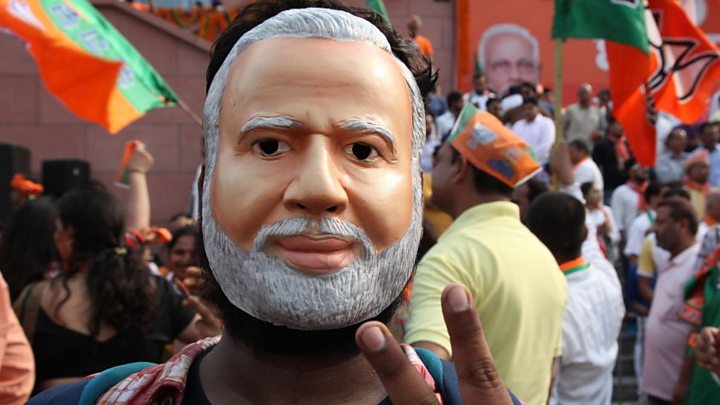Viewpoint: ‘India is at the whim of one man’
Indian PM Narendra Modi made history on Thursday, after he won a second landslide. The BBC’s Jugal Purohit spoke to leading political analyst Pratap Bhanu Mehta about what this means for India.
Q: You recently said that “something is happening which is mutilating the soul of India’s democracy”. Now that the Bharatiya Janata Party (BJP) has returned with a bigger than ever mandate, what do you see for India from now until 2024?
As I said, what makes this election very distinctive is that it has produced – arguably [and] institutionally – the strongest government India has had, possibly since independence. Even Jawaharlal Nehru did not have as much control over his party as Mr Modi does.
I do think, I worry that there was something surreal about this election. My worry is about the fact that we’ve reached a point where truth does not seem to matter. And that is a dangerous point for a democracy.
I do think we are in very uncharted territory. That’s why this moment does represent a significant danger to Indian democracy because democracy survives on the fragmentation of power.
We are now largely at the whims of one person and what he decides to do with this extraordinary mandate that he’s been given.
To me, the most striking aspect is the number of people who are fearful of speaking their minds, including some of India’s most privileged and powerful – so the dominant tenor of this election was not that of a nation marching on with confidence.
When people trust each other and distrust their leaders, you get democracy. When people distrust each other and completely trust their leaders, you get dictatorship.
I think we are at the second moment right now.
Q: One significant and persistent feature of the last five years of the Modi government was the spate of lynchings reported from across the country. How do you analyse the role and importance of those lynchings in his re-election and how do you see that situation going forward from here until 2024?
I think it will be a little too quick to say that lynchings were a causal factor in the consolidation of the BJP.
But I think what they did do was very clearly indicate to their core constituency that this is now a country where majoritarianism can rear its head with impunity. I think [the] lynchings were a politically diabolical move because at that point the BJP understood that any major riots just statistically look bad – and they have the possibility of uniting forces against communalism, which makes lynchings a special kind of modus operandi. Because at one level, it looks like a drip, drip, drip – and doesn’t concentrate your mind in a way that a large cataclysmic event does.
Yet it manages to send a signal that various communities should know their place. I think the need to periodically remind people that this is a Hindu majority country and the marginalisation of what you might call this composite history – I think that trend will accelerate.
Q: Do you believe that it is time for the Gandhi family and Rahul Gandhi in particular to let go of the Congress party’s leadership?
He does not have the moral right and I think he will own up to the responsibility of the defeat. That’s not the issue. The issue is what do you do after that – and all I am saying is simply removing Rahul [Gandhi] tomorrow doesn’t solve your core problem. I think Congress needs a complete overhaul of its leadership.
Source: Read Full Article



